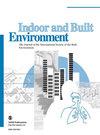Seasonal indoor air quality, self-reported health and comfort amongst tenants living at Danish multi-family social housing sites
IF 2.9
3区 工程技术
Q2 CONSTRUCTION & BUILDING TECHNOLOGY
引用次数: 0
Abstract
Studies have identified seasonal differences between the indoor environment and residents’ comfort, as well as an association between indoor air quality (IAQ) and residents’ overall health. Furthermore, measured IAQ is not always aligned with perceived IAQ. The HOME-Health study is a cross-sectional study with seasonal measurements of IAQ amongst residents living in social housing. The aim is to describe and analyse measured and perceived IAQ, and residents’ health symptoms. We found a lower relative humidity, temperature (TP) and air change level (h丹麦多户社会住房住户的季节性室内空气质量、自我报告的健康状况和舒适度
研究发现,室内环境与居民的舒适度之间存在季节性差异,室内空气质量(IAQ)与居民的整体健康之间也存在关联。此外,测量的 IAQ 并不总是与感知的 IAQ 一致。居家-健康 "研究是一项横断面研究,对居住在社会住房中的居民的室内空气质量进行季节性测量。目的是描述和分析测量到的和感知到的室内空气质量,以及居民的健康症状。我们发现,与夏季相比,冬季的相对湿度、温度(TP)和空气变化水平(h-1)较低,二氧化碳(CO2)水平较高。一般来说,拥挤程度越高的公寓,室内空气质量水平越高。无法进行交叉通风增加了室内空气质量,而房间数量越多则降低了室内空气质量。总体而言,测量到的室内空气质量与感知到的室内空气质量之间没有明显的一致性,但我们发现一个趋势,即二氧化碳含量越高,感知到的室内空气质量越差,尤其是在夏季。总的来说,通风和热不适是最常见的投诉。冬季自我报告的湿度增加,与鼻腔和呼吸道症状有关,而夏季自我报告的湿度则与疲劳和皮肤症状有关。研究结果表明,丹麦社会住房在室内空气质量方面存在挑战,这些挑战与负面健康问题有关。
本文章由计算机程序翻译,如有差异,请以英文原文为准。
求助全文
约1分钟内获得全文
求助全文
来源期刊

Indoor and Built Environment
环境科学-工程:环境
CiteScore
6.40
自引率
25.00%
发文量
130
审稿时长
2.6 months
期刊介绍:
Indoor and Built Environment publishes reports on any topic pertaining to the quality of the indoor and built environment, and how these might effect the health, performance, efficiency and comfort of persons living or working there. Topics range from urban infrastructure, design of buildings, and materials used to laboratory studies including building airflow simulations and health effects. This journal is a member of the Committee on Publication Ethics (COPE).
 求助内容:
求助内容: 应助结果提醒方式:
应助结果提醒方式:


